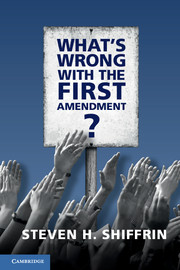8 - Dissent
from PART II
Published online by Cambridge University Press: 05 September 2016
Summary
To this point, I have argued that a commitment to free speech is carried to an extreme when it jeopardizes privacy, justice, equality, and democracy or when it promotes animal cruelty and downplays the serious impact of violent video games on our children. Regrettably, this severely libertarian approach to freedom of speech is allied with a marked insensitivity to the protection of free speech when it most matters. Freedom of speech is most important when it challenges existing customs, habits, institutions, traditions, and authorities. These forms of dissent implicate virtually all of the values that have been associated with free speech including liberty, freedom, equality, justice, tolerance, dignity, self-government, democracy, truth, marketplace values, the checking value, associational values, communitarian values, and cathartic values. Dissent deserves special protection not merely because it consolidates so many important values, but also because the natural reaction of those who are attacked is to censor the speech that offends.
Although many values support protecting dissent, one particularly important value is justice. In any large-scale society, hierarchies will persist. Those who are powerful within hierarchies frequently perceive that those perceptions or policies that reinforce their power are the right ones. Moreover, many in power try to preserve or enlarge their power even without such rationalizations. Those in power are not always corrupt, but corruption is not rare and all of us see the world through a partial perspective. I think it inevitable that some degree of injustice permeates societal hierarchies. We will always need dissent to combat injustice because injustice will always be present. As Reinhold Neibuhr put it, “We cannot fully trust the motives of any ruling class or power. That is why it is important to maintain democratic checks upon the centers of power.”
As will become clear, I do not maintain that dissent should always be protected. Sometimes, dissenting speech is uniquely harmful (consider, calculated defamatory lies about those in powerful positions). Nor do I contend that the United States has done a particularly poor job in protecting dissent in comparison with other countries. Indeed, its record in this area may be better than any other country in the world. But I do maintain that its record is far weaker than it should be.
- Type
- Chapter
- Information
- What's Wrong with the First Amendment , pp. 115 - 132Publisher: Cambridge University PressPrint publication year: 2016

